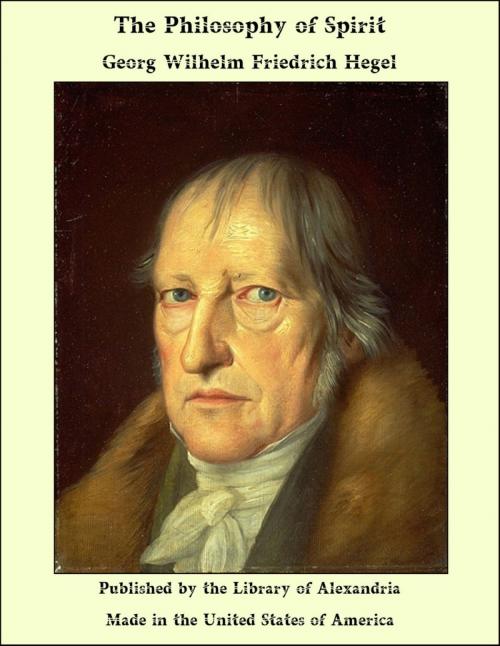The Philosophy of Spirit
Nonfiction, Religion & Spirituality, New Age, History, Fiction & Literature| Author: | Georg Wilhelm Friedrich Hegel | ISBN: | 9781465592750 |
| Publisher: | Library of Alexandria | Publication: | March 8, 2015 |
| Imprint: | Language: | English |
| Author: | Georg Wilhelm Friedrich Hegel |
| ISBN: | 9781465592750 |
| Publisher: | Library of Alexandria |
| Publication: | March 8, 2015 |
| Imprint: | |
| Language: | English |
The knowledge of Mind is the highest and hardest, just because it is the most ‘concrete’ of sciences. The significance of that ‘absolute’ commandment, Know thyself — whether we look at it in itself or under the historical circumstances of its first utterance — is not to promote mere self-knowledge in respect of the particular capacities, character, propensities, and foibles of the single self. The knowledge it commands means that of man’s genuine reality — of what is essentially and ultimately true and real — of mind as the true and essential being. Equally little is it the purport of mental philosophy to teach what is called knowledge of men — the knowledge whose aim is to detect the peculiarities, passions, and foibles of other men, and lay bare what are called the recesses of the human heart. Information of this kind is, for one thing, meaningless, unless on the assumption that we know the universal - man as man, and, that always must be, as mind. And for another, being only engaged with casual, insignificant, and untrue aspects of mental life, it fails to reach the underlying essence of them all — the mind itself. Pneumatology, or, as it was also called, Rational Psychology, has been already alluded to in the Introduction to the Logic as an abstract and generalizing metaphysic of the subject. Empirical (or inductive) psychology, on the other hand, deals with the ‘concrete’ mind: and, after the revival of the sciences, when observation and experience had been made the distinctive methods for the study of concrete reality, such psychology was worked on the same lines as other sciences. In this way it came about that the metaphysical theory was kept outside the inductive science, and so prevented from getting any concrete embodiment or detail: whilst at the same time the inductive science clung to the conventional common- sense metaphysics with its analysis into forces, various activities, etc., and rejected any attempt at a ‘speculative’ treatment.
The knowledge of Mind is the highest and hardest, just because it is the most ‘concrete’ of sciences. The significance of that ‘absolute’ commandment, Know thyself — whether we look at it in itself or under the historical circumstances of its first utterance — is not to promote mere self-knowledge in respect of the particular capacities, character, propensities, and foibles of the single self. The knowledge it commands means that of man’s genuine reality — of what is essentially and ultimately true and real — of mind as the true and essential being. Equally little is it the purport of mental philosophy to teach what is called knowledge of men — the knowledge whose aim is to detect the peculiarities, passions, and foibles of other men, and lay bare what are called the recesses of the human heart. Information of this kind is, for one thing, meaningless, unless on the assumption that we know the universal - man as man, and, that always must be, as mind. And for another, being only engaged with casual, insignificant, and untrue aspects of mental life, it fails to reach the underlying essence of them all — the mind itself. Pneumatology, or, as it was also called, Rational Psychology, has been already alluded to in the Introduction to the Logic as an abstract and generalizing metaphysic of the subject. Empirical (or inductive) psychology, on the other hand, deals with the ‘concrete’ mind: and, after the revival of the sciences, when observation and experience had been made the distinctive methods for the study of concrete reality, such psychology was worked on the same lines as other sciences. In this way it came about that the metaphysical theory was kept outside the inductive science, and so prevented from getting any concrete embodiment or detail: whilst at the same time the inductive science clung to the conventional common- sense metaphysics with its analysis into forces, various activities, etc., and rejected any attempt at a ‘speculative’ treatment.















